Description
Edvard Munch's "Sister Inger" painting is a masterpiece of modern art that has captivated art lovers for decades. This work of art is one of the most famous of the Norwegian artist and is considered one of the best representations of his artistic style.
The painting was created in 1892 and depicts the artist's sister, Inger, who died at a young age. The work is a representation of the sadness and pain that Munch felt after the death of his sister. The composition of the painting is very interesting, as Munch uses a selective focus technique to highlight the figure of Inger at the center of the work.
Color is another important aspect of painting. Munch uses a dark, somber color palette to represent the sadness and grief he feels at the loss of his sister. The use of color also helps to create an atmosphere of melancholy and sadness in the work.
In addition to the story behind the painting, there are other interesting aspects worth mentioning. For example, the selective focus technique that Munch uses in the work is a technique that has been used in modern photography. It is also interesting to note that the painting was created at a time when Munch was experimenting with different artistic styles, making "Sister Inger" a unique work in his career.
In short, "Sister Inger" is a stunning piece of art depicting the sadness and grief Munch felt after his sister's death. The composition, color and technique used in the work are all interesting aspects that make this painting one of the most important in modern art.

